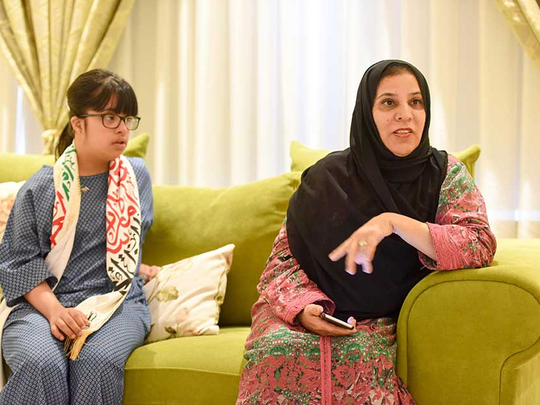
Dubai: Aisha Esmail has never left her daughter’s side, not even entrusting her care with a maid for a day.
The Emirati mother left her work as a clerk at Dubai Hospital 13 years ago after giving birth to her third child, Meera Al Meeza, 13, who was diagnosed to have Down syndrome.
“Meera was born pre-term. When the doctors, after screening Meera, said that she had Down syndrome, I said, ‘Alhamdulillah!’ At that time, I didn’t know what it was, but I have not left her side since. I guided her and taught her every step of the way,” Aisha told Gulf News during a visit.
“Every child is like a recorder. So teach them everything you can, they’ll pick it up.”
Determined to give their youngest child the best education, Aisha’s husband, Shaya, started looking for a special needs centre for Meera.
“The centre in Sharjah was handling special cases so we took her there when she was two years old. We searched for physical therapists everywhere. At that time, I knew it was a test from God,” Shaya said. “And I was motivated to pass the test.”
After several years at the centre, the family was advised to transfer Meera to a mainstream school so she could learn faster. They followed the advice and noticed that Meera related well with other kids.
The family found out about the Community Development Authority’s Dubai Early Childhood Development Centre and registered her to learn how to maximise Meera’s potential as she grew up.
“The centre accepted Meera though she was past the age requirement because they saw Meera was growing fast and doing a lot of things because of the strong support from her father and mother,” Marwa, Meera’s sister, said.
Early screening saves life, saves in rehabilitation cost
Stars help raise $2m for Down Syndrome charity
Now in her seventh grade, Meera said she is enjoying school very much and even social media.
“My favourite subjects are English, Geography and Maths,” the timid teen said, while browsing her Instagram account full of pictures of herself, her friends and schoolmates.
Asked what she would like to become when she grows up, she said: “I want to be a doctor.”
Shaya and Aisha observed that Meera had no fear of needles or of going to the doctor. This was because Meera had gotten used to medical professionals while growing up. Doctors operated on her twice when she was six months old and when she was nine due to a bleeding in her heart.
“Now that she’s growing up to become a young lady, it’s my responsibility to guide her as she enters puberty,” Aisha said.
“Teaching her about how to take care of herself when dealing with others — what’s dangerous and what’s not — that’s my part,” Shaya, a law enforcer, said.
Shaya thanked and lauded the government support they have received from different government agencies and from his superiors in Dubai Police for helping Meera.
The training they got from the centre on how to treat Meera is equally helpful as well. Consistent family support has also contributed to Meera’s development, Shaya said.
“People often tell us, ‘You are lucky to have Meera’. We really are. We see Meera as any other child. We don’t treat her any differently just because she has a disability. To us, that is never an issue.”








